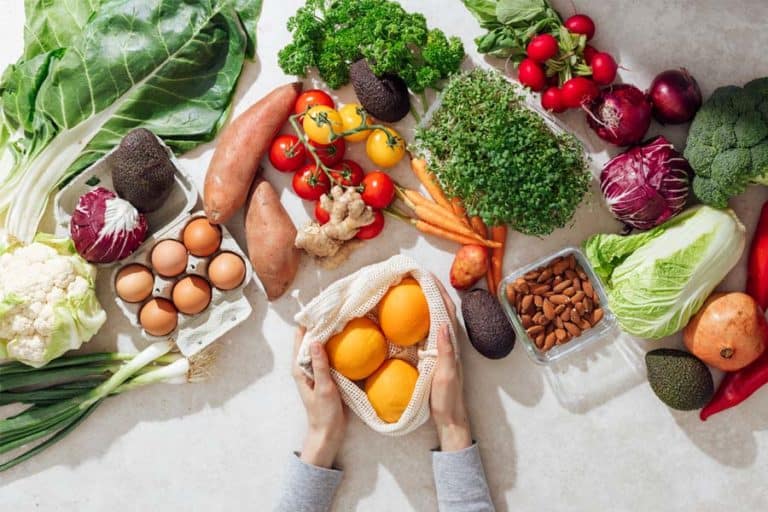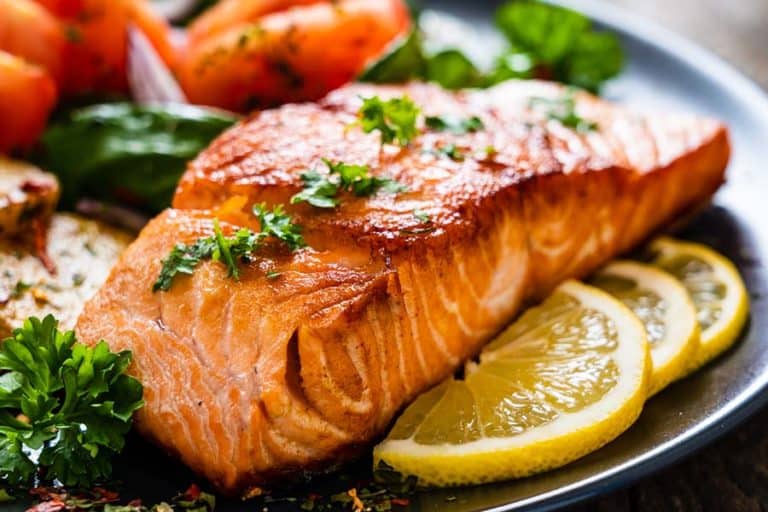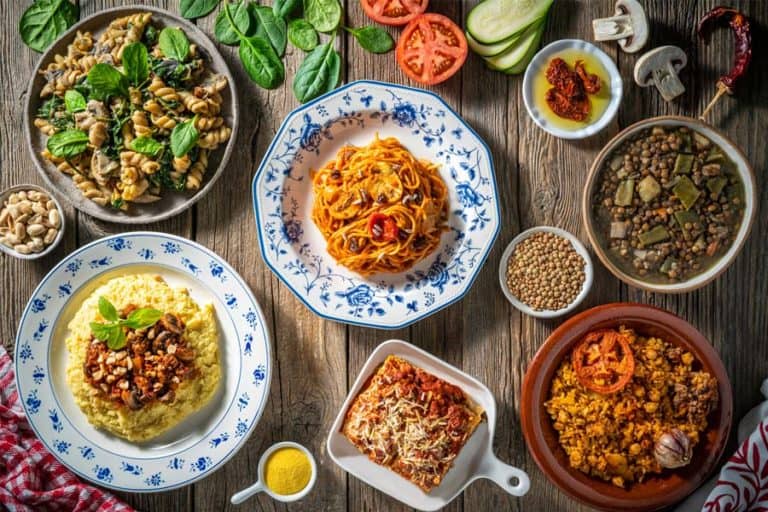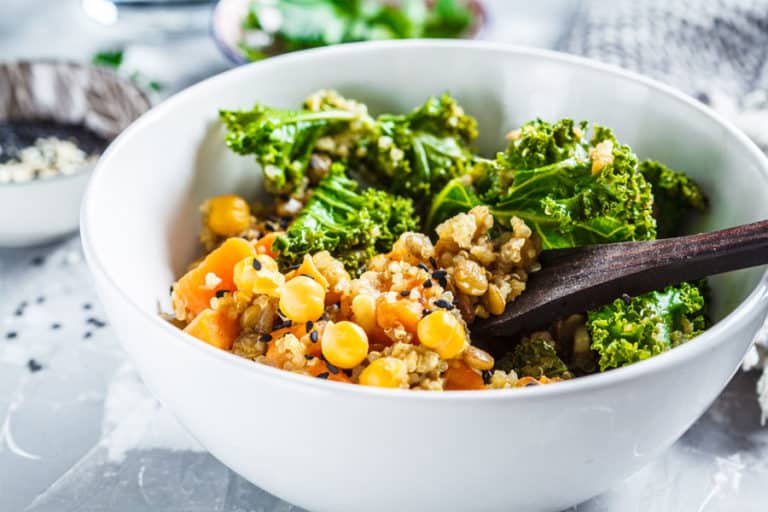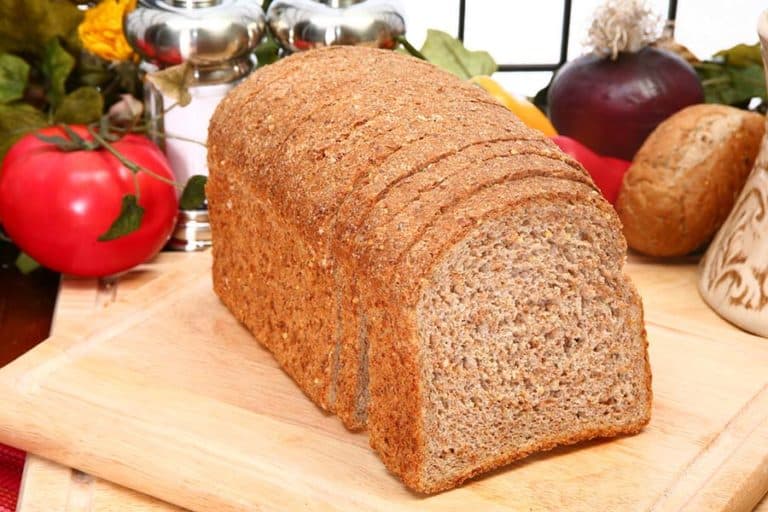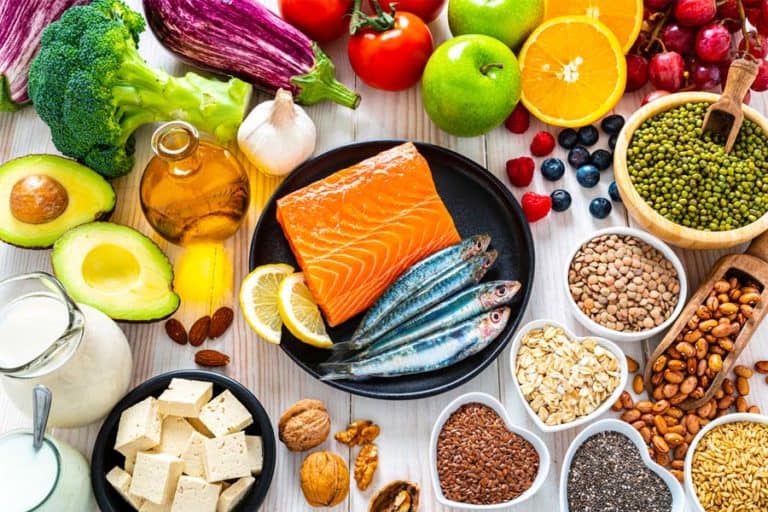Best Foods For A Vegan Anti-Inflammatory Diet
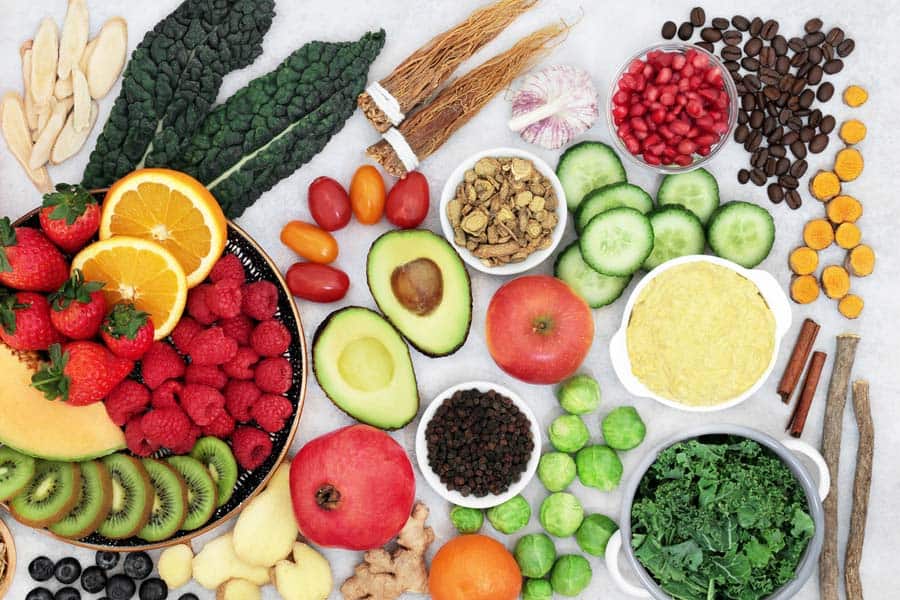
Defining Inflammation | Foods To Eat | Foods To Avoid | Benefits | Who Should Follow | Precautions | 1-week meal plan
Incorporating anti-inflammatory foods into a vegan diet can have numerous health benefits, including reducing the risk of chronic diseases and promoting overall wellness.
We have put together a list of the best foods, benefits, and precautions to consider when following an anti-inflammatory.
What exactly is inflammation?
Inflammation is a response of the body to protect itself from an injury or infection. It is characterized by redness, swelling, warmth, and pain in the affected area.
There are two types of inflammation [1]National Library of Medicine: Chronic Inflammation: acute and chronic.
Acute inflammation: This type of inflammation is the body’s immediate response to an injury or infection. It is a natural and necessary part of the body’s healing process.
Chronic inflammation: This is a long-term condition that occurs when the body’s inflammatory response becomes a continuous state. It is no longer helpful but begins to damage healthy tissue.
This type of inflammation has been linked to a variety of health problems, such as heart disease, arthritis, and cancer [2]National Library of Medicine: Inflammation and Cancer.
Foods to consume on a vegan anti-inflammatory diet
Plenty of vegan foods contain nutrients that have anti-inflammatory properties. Here are some of the best vegan foods to include in an anti-inflammatory diet:
Fruits and vegetables
Fruits and vegetables, especially those that are brightly colored, are packed with antioxidants and other nutrients that help to reduce inflammation. Some of the best anti-inflammatory fruits and vegetables include
- Berries: Studies [3]PubMed: Berries: anti-inflammatory effects in humans suggest that berries contain high levels of polyphenol compounds that have anti-inflammatory properties.
- Tomatoes: According to a study [4]ScienceDirect: The anti-inflammatory effect of lycopene complements the antioxidant action of ascorbic acid and α-tocopherol on tomatoes and the lycopene found in them, tomatoes help reduce inflammation and lower the risk of cardiovascular diseases.
- Cherries and red grapes: Anthocyanins [5]PubMed: CONSUMPTION OF CHERRIES AS A STRATEGY TO ATTENUATE EXERCISE-INDUCED MUSCLE DAMAGE AND INFLAMMATION IN HUMANS, which give cherries and grapes their red color, are known to reduce inflammation. Thus, cherries may help lower the risk of chronic inflammatory diseases.
- Oranges: Citrus fruits [6]National Library of Medicine: Citrus fruits as a treasure trove of active natural metabolites that potentially provide benefits for human health like oranges are rich in vitamin C. As vitamin C is a powerful antioxidant with anti-inflammatory and immune defense [7]PubMed: Vitamin C and Immune Function properties, oranges help to reduce inflammation.
- Green leafy vegetables: Vitamin K [8]National Library of Medicine: Vitamin K as a Powerful Micronutrient in Aging and Age-Related Diseases: Pros and Cons from Clinical Studies-rich green leafy vegetables like spinach, kale, and collard help to reduce inflammation by reducing the production of pro-inflammatory cytokines.
- Legumes: Research [9]PubMed: Potential anti-inflammatory effects of legumes: a review suggests that legumes like beans, peas, and lentils contain high levels of bioactive compounds like peptides, saponins, and polyphenols, which have anti-inflammatory and antihypertensive effects.
- Pomegranate: The ellagitannins present in pomegranate help to reduce inflammation by inhibiting the production of pro-inflammatory cytokines.
- Onions: Onions [10]National Library of Medicine: A review of anti-inflammatory, antioxidant, and immunomodulatory effects of Allium cepa and its main constituents are rich in anti-inflammatory compounds such as phenolic acid, aglycones, cepaenes, flavonoids, etc.
- Sweet potatoes: Sweet potatoes contain high levels of vitamins C and B6, both of which have been shown to reduce inflammation.
Nuts and seeds
Nuts and seeds are a good source of vegan protein and contain high levels of anti-inflammatory nutrients like essential fatty acids, vitamins, minerals, and antioxidants.
Some of the best anti-inflammatory nuts and seeds include:
- Walnuts
- Almonds
- Flaxseeds
- Pumpkin seeds
- Hemp seeds
- Chia seeds
Herbs and spices
Most herbs and spices have anti-inflammatory effects that you can include in your anti-inflammatory vegan diet.
- Turmeric
- Cayenne pepper
- Ginger
- Garlic
- Cinnamon
- Oregano
- Red chili powder
- Coriander
- Cilantro
- Bay leaf
- Basil
Vegan foods you should avoid on an anti-inflammatory diet
You should avoid some foods on an anti-inflammatory diet, as they can promote inflammation. These include
- Refined carbs- white bread, white rice, crackers, and cookies.
- Processed foods- potato chips, popcorn, and soy bars.
- Trans fats- hydrogenated oils and margarine.
- Added sugars- high fructose corn syrup and artificial sweeteners.
- Fried foods- french fries and other fried vegan fast foods.
Benefits of eating vegan anti-inflammatory foods
As a vegan diet eliminates animal products, the body is more likely to absorb the nutrients from plant-based foods. This makes a vegan diet an ideal diet for reducing inflammation.
One obvious benefit of eating vegan anti-inflammatory foods is that they can reduce inflammation in the body. However, eating anti-inflammatory vegan foods has been linked to a variety of other health benefits as well, such as:
1. Increased energy levels
Vegan anti-inflammatory foods help to reduce inflammation and boost the body’s natural energy production.
2. Improves gut health
Eating a vegan diet has been shown to promote the growth of healthy gut bacteria. Gut bacteria play an important role in human health, as they help to break down food, absorb nutrients, and fight harmful bacteria.
3. Weight management
An anti-inflammatory vegan diet can help reduce the risk of obesity and make it easier to manage existing weight issues.
4. Reduced risk of cancer
Untreated chronic inflammation can cause DNA damage over time and lead to cancer. Numerous studies have shown that plant-based diets [11]National Library of Medicine: The Impact of Plant-Based Dietary Patterns on Cancer-Related Outcomes: A Rapid Review and Meta-Analysis can help to protect against various types of cancer, including breast cancer, colon cancer, and prostate cancer. So, vegan foods are a great option if you want to follow an anti-inflammatory diet.
Who should follow an anti-inflammatory vegan diet?
A vegan anti-inflammatory diet is ideal for people who are looking to improve their gut health, reduce bloating and inflammation, and promote weight loss.
This type of diet is also beneficial for those with chronic conditions such as heart disease, arthritis, and Crohn’s disease.
People with celiac disease or gluten intolerance may also find that a vegan anti-inflammatory diet helps to ease their symptoms. However, some vegan foods like wheat bread, oatmeal, and soy sauce contain gluten. So, be sure to read the nutrition labels of any vegan foods you buy when you are on a vegan gluten-free diet.
Precautions to keep in mind
Although a vegan diet is a great way to start your anti-inflammatory journey, it’s important to keep in mind a few precautions.
1. Ensure you get enough protein
Protein is essential for the body to function properly and repair itself. Eating enough protein on your anti-inflammatory diet can help to reduce inflammation by boosting the immune system.
Vegan sources of protein include tofu, tempeh, nuts, seeds, legumes, grains, and plant-based protein powders.
2. Watch your iron intake
Iron is important for the production of red blood cells, which carry oxygen around the body. Iron deficiency is associated with inflammation, so it’s important to make sure you get enough iron on a vegan diet.
Plant-based sources of iron include dark leafy greens, whole grains, chickpeas, lentils, spinach, and quinoa.
3. Limit your alcohol consumption
Although there are many vegan alcohol options, excessive drinking can still lead to inflammation in the body. So, keeping your alcohol consumption in check when following an anti-inflammatory diet is important.
4. Eat low-glycemic foods
High glycemic foods can result in high blood sugar levels associated with inflammation. Low glycemic foods release glucose slowly into the body, preventing spikes in blood sugar levels.
Thus eating low-glycemic foods like oats, sweet potatoes, legumes, and quinoa on a vegan anti-inflammatory diet can help reduce inflammation.
5. Add healthy fats to your diet
Healthy fats are important for hormone balance and can help reduce inflammation. Vegan sources of healthy fats include flax seeds, chia seeds, hemp seeds, walnuts, and avocados.
1-week vegan anti-inflammatory meal plan
Here is a 1-week sample vegan anti-inflammatory meal plan.
| Day | Breakfast | Lunch | Snacks | Dinner |
| Monday | Turmeric chia seed pudding | Roasted veggies with quinoa | Air-fried pumpkin seeds | Coconut rice with turmeric and spiced chickpeas |
| Tuesday | Oat porridge with berries | Tahini mustard, sweet potato, and lentil salad | Carrot hummus | Butternut squash noodles with spinach |
| Wednesday | Lentil salad with tomatoes and cucumbers | Pomegranate avocado salad | Roasted pistachios | Chickpea falafels |
| Thursday | Whole wheat bread avocado toast | Vegan cream spinach with brown rice | Vegan orange cake | Quinoa and citrus salad |
| Friday | Scrambled tofu with stir-fried veggies | Mushroom tacos | Pomegranate avocado salad | Coconut rice with turmeric and spiced chickpeas |
| Saturday | Peanut butter breakfast bar | Chickpea salad sandwich | Turmeric latte | Bean with tomato salad |
| Sunday | Chia seed porridge | Cucumber and tomato salad with hummus | Kiwi and pineapple smoothie | Chickpea and sweet potato salad |
Conclusion
A vegan anti-inflammatory diet is an excellent way to reduce inflammation in the body. This, in turn, can prevent the risk of several chronic diseases in the long run.
However, be sure to consult with your personal nutritionist before making any major dietary changes. With the right guidance and support, you can transition to a vegan anti-inflammatory diet and enjoy its many health benefits.
References


